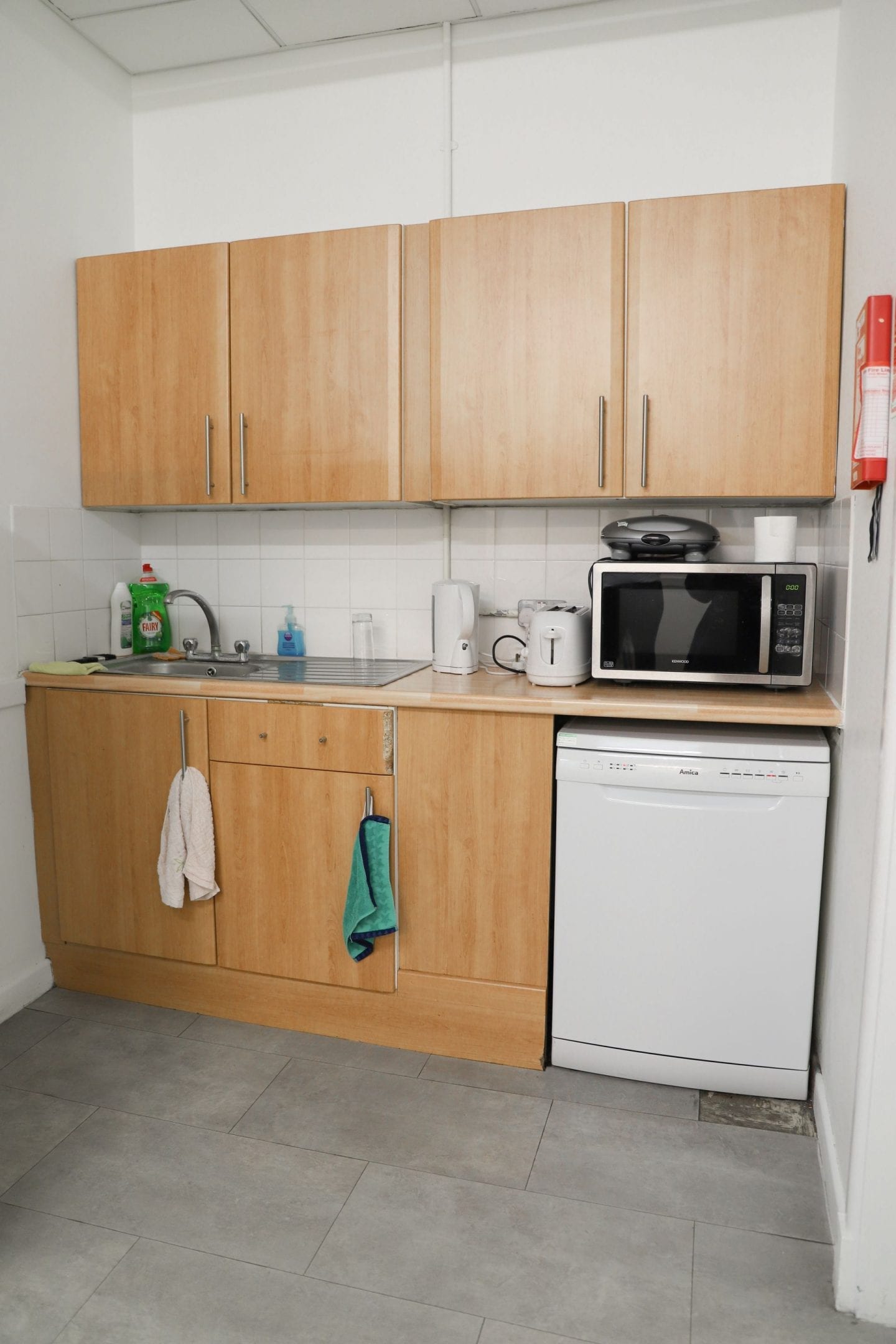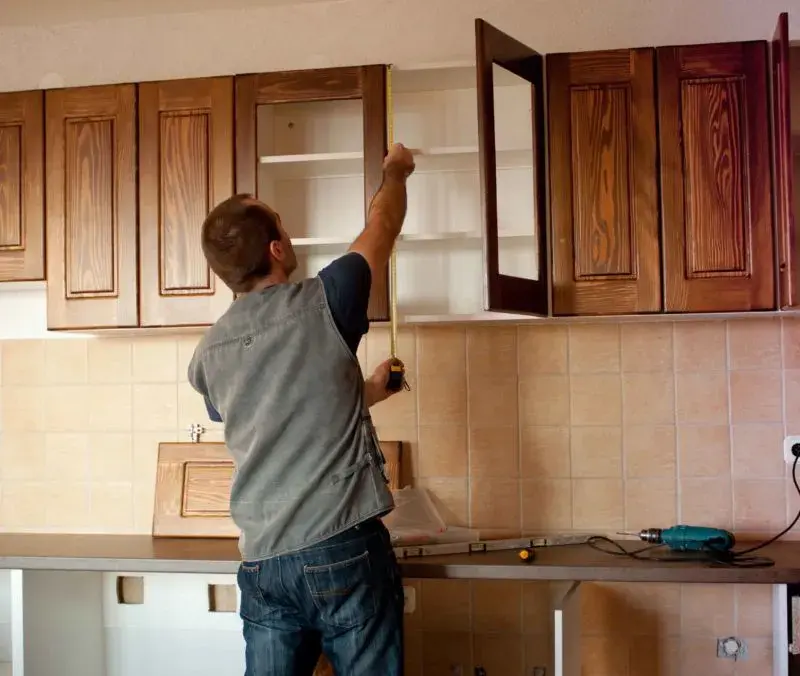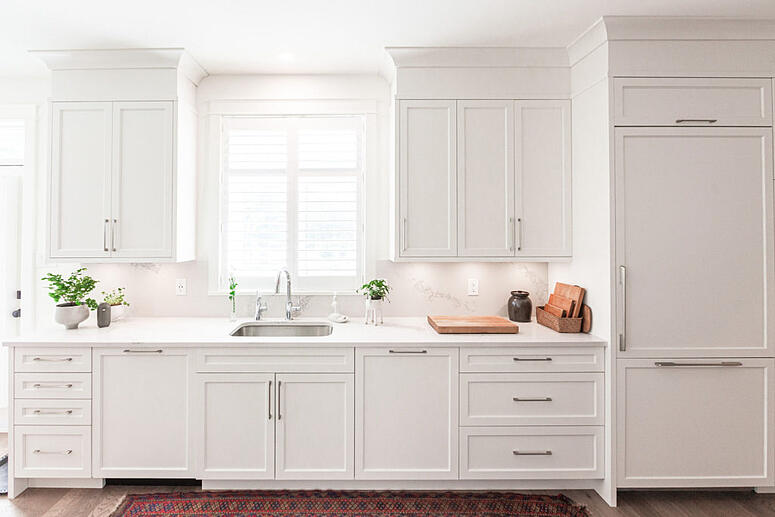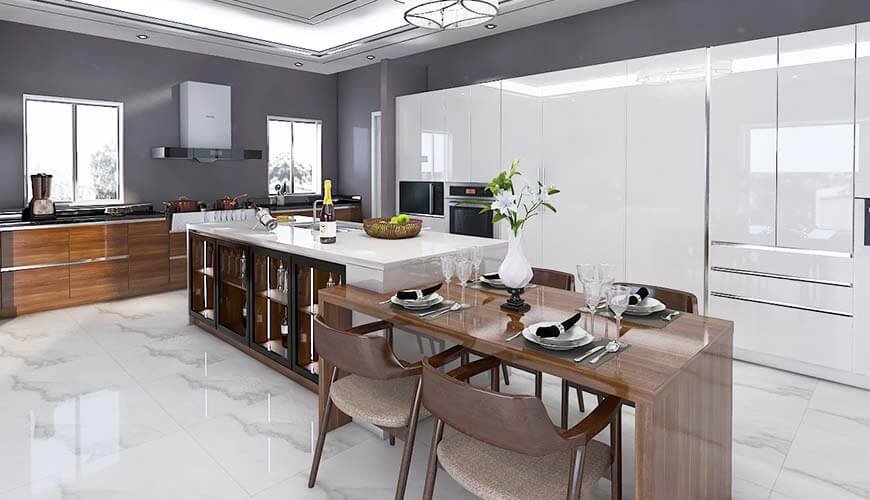Yes, MDF can be used for kitchen cabinets. It is durable, cost-effective, and provides a smooth surface for painting.
MDF, or Medium-Density Fiberboard, is a popular choice for kitchen cabinets due to its affordability and versatility. Made from wood fibers and resin, MDF offers a smooth and uniform surface ideal for painting and veneering. It is resistant to warping and cracking, making it a reliable material for kitchen environments.
MDF is also easier to shape and customize compared to solid wood, allowing for intricate designs and finishes. Despite being less durable than solid wood, MDF kitchen cabinets can last many years with proper care. Choosing MDF can be a smart decision for those seeking stylish, budget-friendly kitchen cabinetry.
Table of Contents
ToggleBenefits Of Mdf Cabinets
Medium Density Fiberboard (MDF) is a popular choice for kitchen cabinets. MDF has many advantages that make it a favored material in modern kitchens. This section explores the benefits of MDF cabinets.
Cost-effective Option
MDF cabinets offer a budget-friendly alternative to solid wood cabinets. MDF is made from wood fibers and resin, which are pressed together. This process makes MDF cheaper to produce than solid wood.
Here’s a quick comparison:
| Material | Cost |
|---|---|
| Solid Wood | High |
| MDF | Low |
Choosing MDF can save you a lot of money. This makes it an attractive option for those on a budget.
Smooth Surface For Painting
MDF has a smooth and even surface. This makes it ideal for painting. The smooth surface allows for a flawless paint finish.
Here are some benefits of painting MDF cabinets:
- No wood grain to show through the paint.
- Easy to achieve a high-gloss finish.
- Great for custom colors and designs.
Painting MDF cabinets can give your kitchen a sleek and modern look. You can also repaint them easily if you want a fresh look.

Design Flexibility
One of the most significant advantages of using MDF for kitchen cabinets is its design flexibility. MDF, or Medium-Density Fiberboard, allows for a wide range of customizations. This makes it a popular choice for modern kitchen designs. Let’s explore the various aspects of design flexibility offered by MDF.
Custom Shapes And Sizes
MDF can be easily cut into custom shapes and sizes. This is possible due to its uniform structure. You can achieve intricate designs and detailed carvings without splintering. This is perfect for creating unique cabinet doors and panels. Whether you want traditional or contemporary styles, MDF can meet your design needs.
Here are some benefits of custom shapes and sizes with MDF:
- Perfect for intricate designs and detailed carvings
- Uniform structure ensures smooth edges and surfaces
- Easy to cut and shape without splintering
- Suitable for both traditional and contemporary designs
Variety Of Finishes
MDF offers a wide variety of finishes that cater to different tastes and preferences. You can paint, veneer, or laminate MDF surfaces. This makes it easy to match your kitchen’s decor. MDF can mimic the look of natural wood or provide a sleek, modern finish.
Here are some popular finishes for MDF kitchen cabinets:
| Finish Type | Description |
|---|---|
| Paint | Available in any color, smooth finish |
| Veneer | Natural wood look, various wood types |
| Laminate | Durable, easy to clean, various patterns |
Choosing the right finish enhances the aesthetic appeal of your kitchen. It also provides protection and durability to the cabinets. MDF’s design flexibility makes it a versatile material for any kitchen style.
Durability Concerns
When considering materials for kitchen cabinets, durability is a key factor. Medium Density Fiberboard (MDF) is a popular choice, but how does it stack up in terms of durability? Let’s delve into some of the main concerns.
Susceptibility To Moisture
MDF is more susceptible to moisture compared to solid wood. This can be a significant issue in a kitchen environment, where water and steam are common. MDF can swell or warp when exposed to high humidity or direct water contact. This makes it less ideal for areas near sinks or dishwashers.
| Material | Moisture Resistance |
|---|---|
| MDF | Poor |
| Solid Wood | Good |
Strength Comparison
In terms of strength, MDF is less robust than plywood or solid wood. It is made from wood fibers bonded with resin, which makes it denser but not necessarily stronger. MDF is prone to dents and scratches, which can be a concern in a high-use area like a kitchen.
- MDF: Prone to dents and scratches.
- Plywood: More durable and resilient.
- Solid Wood: The most durable option.
Despite these concerns, MDF has its advantages. It offers a smooth surface that is excellent for painting. It is also more affordable than solid wood, making it a budget-friendly option for many homeowners.
Maintenance Requirements
Maintaining MDF kitchen cabinets is crucial for their longevity. Proper care ensures they remain beautiful and functional. This section covers essential maintenance tips.
Cleaning Tips
Regular cleaning keeps MDF cabinets looking new. Use a soft cloth and mild detergent. Avoid abrasive cleaners that can scratch the surface. Follow these simple steps for effective cleaning:
- Mix mild detergent with warm water.
- Dip a soft cloth in the solution.
- Wipe the cabinets gently.
- Dry with a clean cloth to prevent water damage.
Preventing Damage
Preventing damage extends the life of MDF kitchen cabinets. Take these precautions to keep them in top condition:
- Avoid excessive moisture: Water can cause MDF to swell.
- Use coasters and placemats: Protect surfaces from hot items.
- Handle with care: Do not slam doors and drawers.
- Repair chips immediately: Use wood filler to fix any chips.
Implementing these tips ensures your MDF kitchen cabinets remain durable and attractive.
Installation Process
Installing MDF kitchen cabinets can be a straightforward task. With the right tools and a step-by-step guide, you can achieve a professional finish. Below, we outline the necessary tools and detailed steps to help you get started.
Tools Needed
- Electric Drill
- Screwdriver Set
- Measuring Tape
- Level
- Clamps
- Wood Glue
- Pencil
- Safety Gear (gloves, goggles)
Step-by-step Guide
- Measure the space for the cabinets using a measuring tape.
- Mark the cabinet positions on the wall with a pencil.
- Attach the MDF panels using wood glue and clamps.
- Drill holes for screws with an electric drill.
- Screw the panels together using a screwdriver set.
- Install the cabinets on the wall, ensuring they are level.
- Secure the cabinets with additional screws for stability.
| Step | Action | Tool |
|---|---|---|
| 1 | Measure the space | Measuring Tape |
| 2 | Mark cabinet positions | Pencil |
| 3 | Attach MDF panels | Wood Glue, Clamps |
| 4 | Drill holes | Electric Drill |
| 5 | Screw panels together | Screwdriver Set |
| 6 | Install cabinets on the wall | Level |
| 7 | Secure cabinets | Screwdriver Set |
Comparing Mdf With Other Materials
When deciding on materials for kitchen cabinets, it’s important to compare options. MDF, plywood, and solid wood are popular choices. Each has unique qualities. Let’s explore how MDF stacks up against plywood and solid wood.
Mdf Vs. Plywood
MDF (Medium Density Fiberboard) is made from wood fibers and resin. It’s smooth and easy to paint. On the other hand, plywood consists of thin wood layers glued together. This makes plywood more durable and water-resistant.
| Feature | MDF | Plywood |
|---|---|---|
| Durability | Less durable | More durable |
| Water Resistance | Low | High |
| Cost | Lower | Higher |
| Surface | Smooth | Textured |
Plywood is tougher and handles moisture better. MDF, however, is cheaper and has a smoother surface. Choose plywood for durability. Use MDF for a sleek, painted finish.
Mdf Vs. Solid Wood
Solid wood is natural and strong. It looks beautiful and lasts long. MDF is man-made and uniform. It’s cheaper and doesn’t warp.
- Appearance: Solid wood has a natural grain. MDF is smooth and uniform.
- Cost: MDF is budget-friendly. Solid wood is more expensive.
- Strength: Solid wood is sturdy. MDF is less strong.
- Maintenance: Solid wood can swell with moisture. MDF doesn’t warp but may swell if exposed to water.
Solid wood cabinets offer a timeless look and high strength. MDF provides a smooth finish and is cost-effective. Each material serves different needs and preferences.
Case Studies
Understanding the practical applications of MDF for kitchen cabinets can provide valuable insights. Real-life examples and user experiences highlight the benefits and challenges of using MDF. This section delves into specific case studies to give a clearer picture.
Real-life Examples
Many homeowners have successfully installed MDF kitchen cabinets. One notable example is a family from New York. They chose MDF for its affordability and smooth finish. Their kitchen cabinets have lasted over five years without any issues.
A couple in California revamped their kitchen using MDF. They painted their cabinets to match their modern decor. The cabinets have remained durable and stylish. Their positive experience showcases MDF’s versatility.
User Experiences
User feedback is crucial for understanding the pros and cons of MDF kitchen cabinets. Below is a table summarizing some user experiences:
| User | Location | Experience |
|---|---|---|
| John D. | Texas | Happy with the cost-effectiveness and smooth finish. |
| Sarah K. | Florida | Found MDF easy to paint and maintain. |
| Mike L. | Ohio | Noted some wear and tear over time but satisfied overall. |
Many users appreciate MDF for its budget-friendly nature. They also highlight its ease of customization. Some users mention minor issues with moisture resistance. Overall, the feedback leans positive, with many recommending MDF for kitchen cabinets.


Frequently Asked Questions
Is Mdf Good For Kitchen Cabinets?
MDF is durable, cost-effective, and paints well, making it a good choice for kitchen cabinets.
How Durable Is Mdf For Cabinets?
MDF is quite durable and resists warping, making it suitable for kitchen cabinets.
Can Mdf Handle Moisture In Kitchens?
MDF can handle some moisture but should be sealed properly to avoid swelling.
Is Mdf Cheaper Than Plywood For Cabinets?
Yes, MDF is generally cheaper than plywood, making it a budget-friendly option for cabinets.
Does Mdf Paint Well For Kitchen Cabinets?
MDF has a smooth surface, making it ideal for painting kitchen cabinets.
Is Mdf Eco-friendly For Cabinets?
MDF is made from recycled wood fibers, making it an eco-friendly option for cabinets.
Can Mdf Be Used For Cabinet Doors?
Yes, MDF is commonly used for cabinet doors due to its smooth finish.
How To Maintain Mdf Kitchen Cabinets?
Keep them dry and clean. Avoid harsh chemicals to maintain their finish.
Is Mdf Strong Enough For Heavy Kitchen Items?
MDF is strong and can support heavy items when properly constructed.
Can Mdf Be Customized For Cabinet Designs?
Yes, MDF is easy to cut and shape, allowing for custom cabinet designs.
Conclusion
MDF can be a viable option for kitchen cabinets. It offers affordability, versatility, and a smooth finish. Ensure proper sealing to prevent moisture damage. Weigh the pros and cons to decide if MDF suits your needs. Always consult with professionals for the best results in your kitchen renovation.


